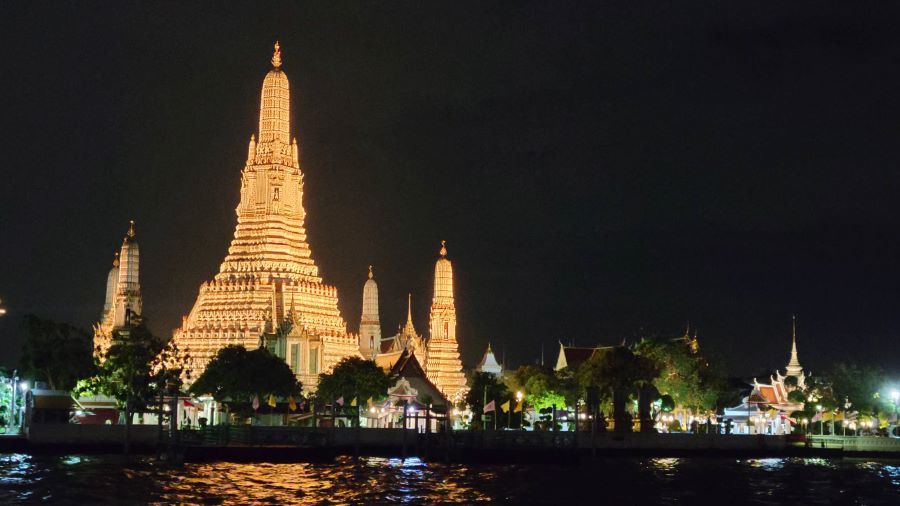Must visit Temples in Bangkok to explore
In this post we explore the 5 most important temples to visit here in Bangkok, Thailand that will inspire you to visit these historic and holy sites that are open to the public to visit. Use this short guide to show you the main attractions, locations and important features to see at each temple complex in Bangkok. Most of the temples are easily located along or close to the important river artery at the Chao Phraya River.
Explore the top holy temples of Bangkok along the Chao Phraya, stunning views, detailed history and visiting information
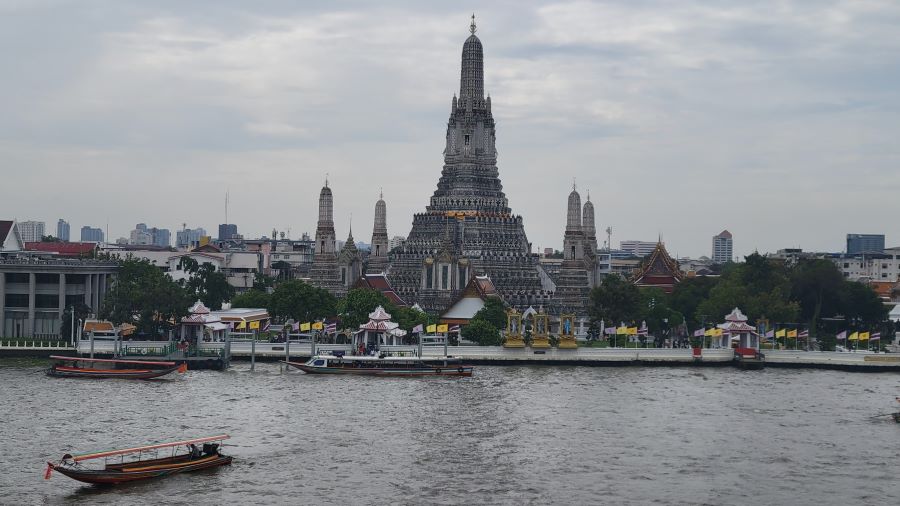
1. Wat Arun (Temple of Dawn)
Located right on the Chao Phraya River in Thonburi, is the magnificent Temple of Dawn or Wat Arun. Filled with historic and cultural legend and built since the existence of the capital back then in Ayutthaya, the Temple was built under the dictate of King Taksin who saw the temple when dawn just started in Thonburi or ancient Bangkok. Wat Arun once housed the famous Emerald Buddha when it was brought from Laos from during King Taksin’s reign but during the reign of King Rama I, who established the new capital city at Bangkok, the Emerald buddha was then moved to Wat Phra Kaew (The Temple of the Emerald Buddha completed in 1784. Even still Wat Arun is noted as one of the most popular and beautiful temples in Bangkok to visit and is beautifully illuminated at night when touring the main chanal of the Chao Phraya River.
Here’s what I found for Wat Arun (Temple of Dawn) in Bangkok:
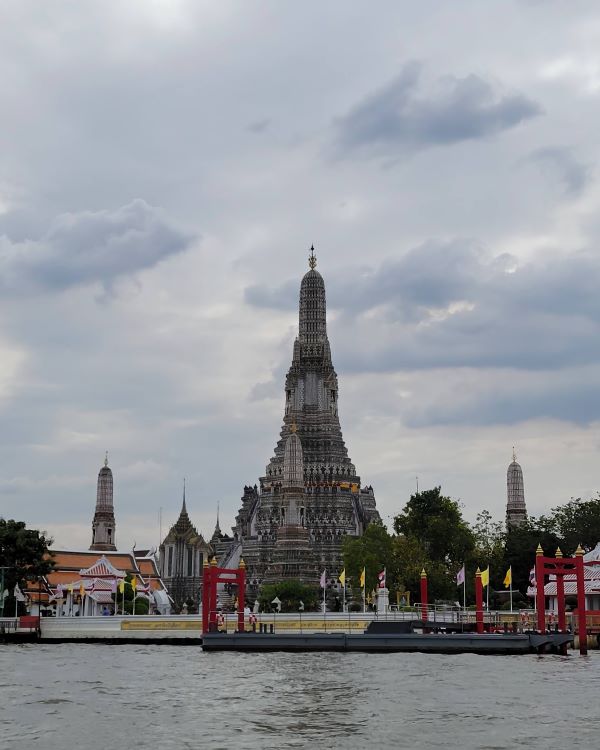
Official Website
According to Wikipedia, the official website is listed as www.watarun1.com (Wikipedia).
⏰ Hours & Entrance Fees
Multiple reliable sources consistently confirm these details:
- Opening Hours: Daily from 8:00 AM to 6:00 PM
- Entrance Fee: For foreign tourists, the standard entry fee is 200 THB
Summary Table
| Detail | Information |
|---|---|
| Official Website | www.watarun1.com |
| Visiting Hours | Daily, 8:00 AM – 6:00 PM (last entry ~5:30 PM) |
| Entrance Fee (Foreign) | 200 THB |
| Thai Nationals/Children | Usually free or discounted |
A Few Quick Tips (optional extras)
- Best times to visit: Early morning (8–10 AM) for fewer crowds, or late afternoon (4–6 PM) for better light and cooler weather
- Dress code: Shoulders and knees must be covered. Don’t worry if you forget—sarongs or cover-ups are often available for rent at the entrance
- Getting there: It’s all part of the fun—ferries across the Chao Phraya River often depart from Tha Tien Pier
Here’s a beautiful video tour of the morning timeframe at Wat Arun on the banks of the Chao Phraya River below
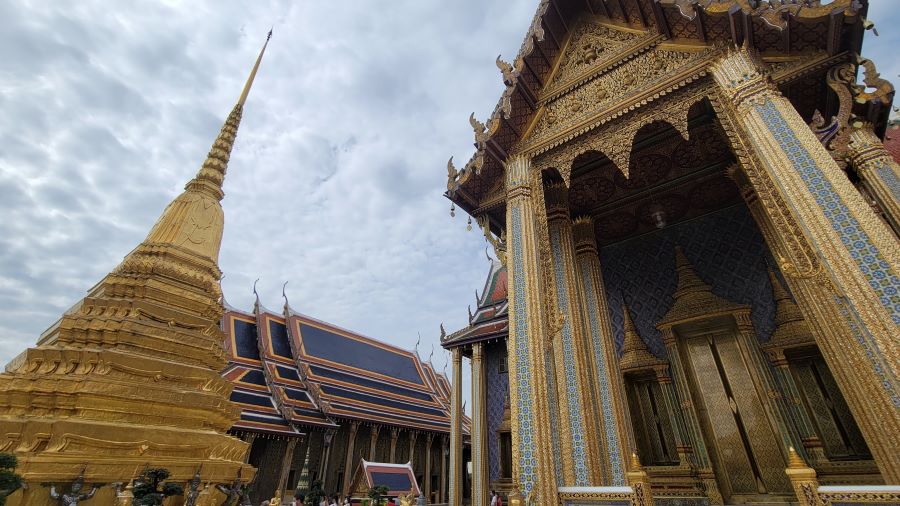
2. Wat Phra Kaew (The Temple of the Emerald Buddha)
One of the most important temples and must visit in Bangkok is Wat Phra Kaew better known as the Temple of the Emerald Buddha and is a holy temple for the Thai people. Located on the grounds of the Grand Palace, Wat Phra Kaew was placed by Rama I who moved the solid Emerald statue from Ayutthaya to Bangkok and created this temple as its permanent home. The Emerald Buddha has be sitting on its famous altar since 1784 and is the most visited relic and has traveled all around Southwest Asia from India, Sri Lanka, Cambodia to Laos and then to Thailand originally located in Chiang Mai and then the ancient capital at Ayutthaya.
The emerald buddha is intricately carved from a single block of large jade and it holds a very significant cultural and religious importance. The Buddha was moved several times from various wars and the statue being captured and finally placed at Wat Phra Kaew where it symbolizes Thai Sovereignty and spirituality.
While visiting the temple, you can also visit the Grand Palace complex commissioned by King Rama I and served as the royal residence for the Thai kings and is still used for many important ceremonial events.
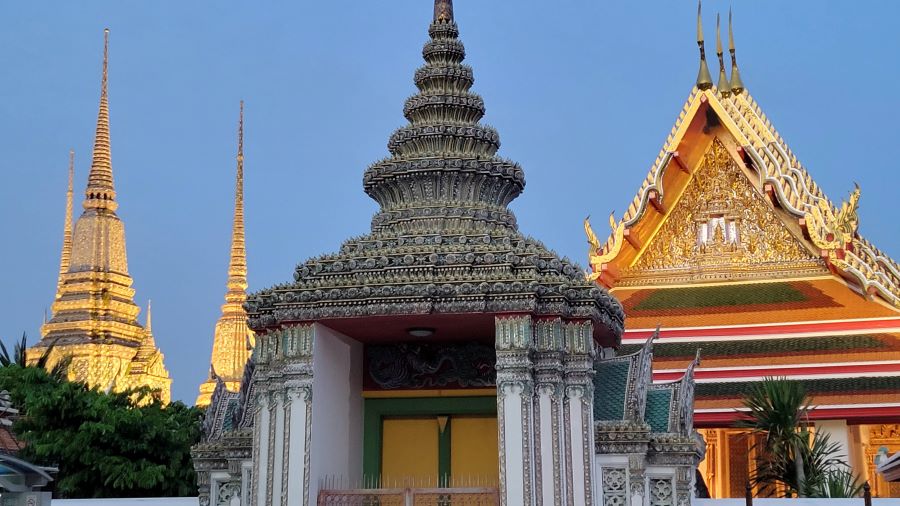
Official Website & Contact
While there doesn’t seem to be a dedicated standalone site for Wat Phra Kaew, you can find all official visitor info via the Grand Palace’s website, since the temple is located within the same complex. The practical information page offers hours, fees, access rules, and more (royalgrandpalace.th).
Contact info on that site lists a phone number: +66-2-623-5500 (extensions 2171 or 2158) (royalgrandpalace.th).
Opening Hours
- The complex, including Wat Phra Kaew, is open daily from 8:30 AM to 3:30 PM for visitors
- A note elsewhere mentions the palace grounds remain open until 4:30 PM, but tickets are only sold until 3:30 PM
- A practical tip is to arrive early — ideally before 3:00 PM to ensure you have enough time to explore
Entrance Fee
- 500 THB per person is the standard fee for foreign visitors. This includes access to Wat Phra Kaew and the Queen Sirikit Museum of Textiles within the Grand Palace complex
- Children under 120 cm (about 4 ft) generally enter for free
Summary Table
| Feature | Details |
|---|---|
| Website Info | Available via the Grand Palace official site |
| Contact | +66-2-623-5500 (Ext. 2171, 2158) |
| Hours | Open 8:30 AM – 3:30 PM (grounds open until 4:30 PM) |
| Ticket Sale | Ends at 3:30 PM |
| Ticket Price | 500 THB per adult (foreigners) |
| Child Policy | Free entry if under 120 cm |
A Few Tips
- Dress modestly: no sleeveless tops, shorts, short skirts, or revealing attire. If needed, you can rent appropriate clothing near the entrance
- Aim to arrive right when it opens (~8:30 AM) to beat the crowds and make the most of your time
- Be aware that the complex may occasionally close for royal ceremonies—checking ahead via the official site or calling is wise
Here’s a video tour experience visiting Wat Phra Kaew below
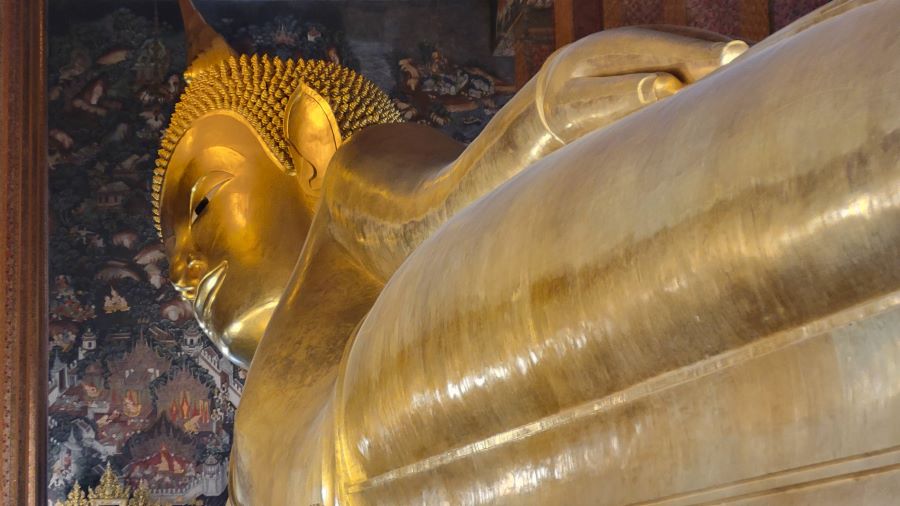
3. Wat Pho (The Temple of the Reclining Buddha)
Also located within the Grand Palace complex is Wat Pho also famously called the Temple of the Reclining Buddha and also built during the reign of King Rama I. The temple is home of one of the largest reclining Buddhas in the world and completed under the reign of King Rama III in 1848.
The impressive statue is about 15 meters in height and is over 46 meters in length and the soles of its feet are covered in mother of pearl. There are also over 1000 Buddha images around the temple and collected from the many ruins from around the country. The temple complex was transformed into a university to preserve the traditional Thai medicine and massage culture that is practiced today on the grounds.
Here’s what I found about visiting Wat Pho (the Reclining Buddha Temple) in Bangkok — including the official website, opening hours, and entrance fees.
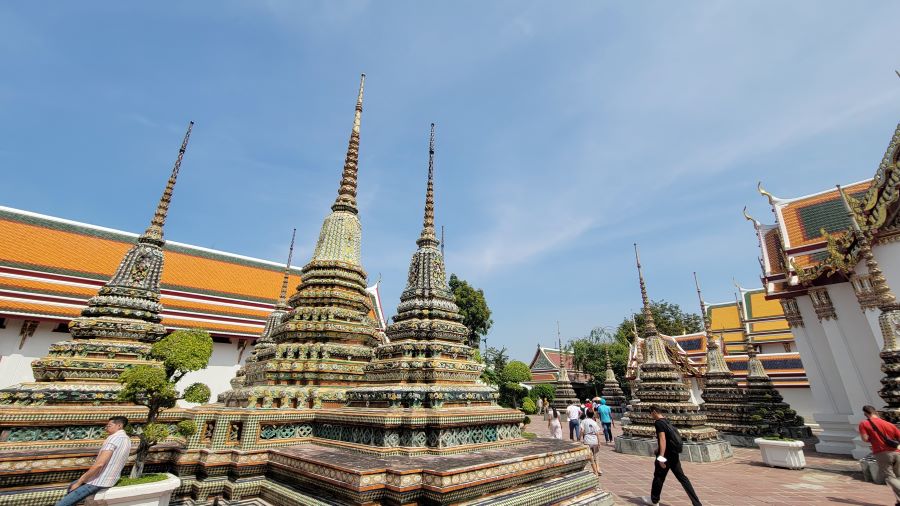
Official Website
Wat Pho’s official website is www.watpho.com (Wikipedia). For email inquiries, you can contact [email protected] (watpho.com).
Opening Hours
Most visitor sources indicate that Wat Pho is open daily from 8:00 AM to 6:30 PM
Entrance Fee
There’s some discrepancy in pricing across different sources:
- 300 THB per person seems the most common rate, with free entry for children under about 120 cm
- Another source cites a 200 THB fee for foreign tourists, with local and children free
- A less consistent mention lists 100 THB, with complimentary water included.
So the typical entrance fee is around 300 THB, though occasional references cite around 200 THB. Children under 120 cm usually enter free — but it’s worth double-checking especially if you’re planning with family.
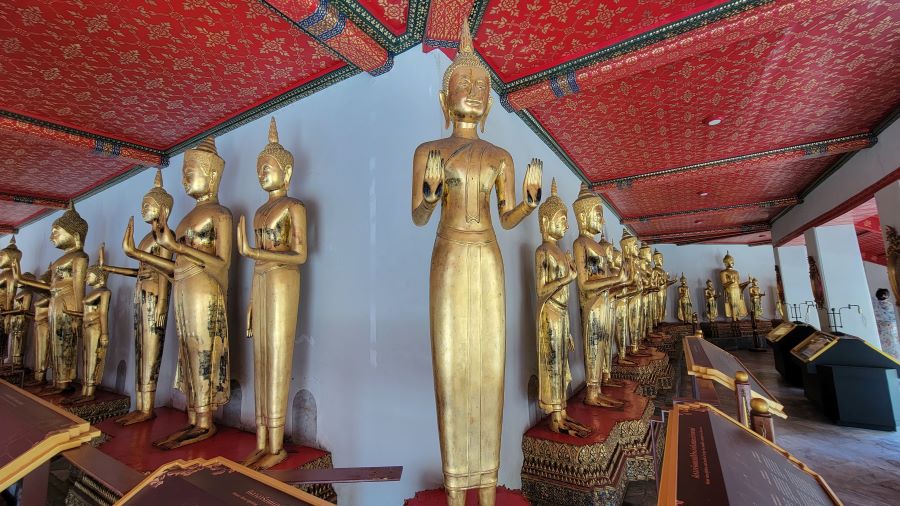
Hall of 1000 Buddhas
Summary
| Detail | Info |
|---|---|
| Website | www.watpho.com; Email: [email protected] |
| Opening Hours | Generally 8:00 AM – 6:30 PM daily (some sources say until 7:30 PM) |
| Entrance Fee | Typically ~300 THB per adult, free for kids under ~120 cm; alternate reports of 200 THB are possible |
Pro Tips
- Arrive early or later in the day to miss the heat and crowds — both morning and late afternoon are quieter
- Dress respectfully: cover shoulders and knees. You’ll need to remove your shoes when entering temple structures
- If you’re looking to indulge in a traditional Thai massage, Wat Pho is the go-to place — their massage school is world-renowned
Here’s a video tour experience at Wat Pho for inspiration below
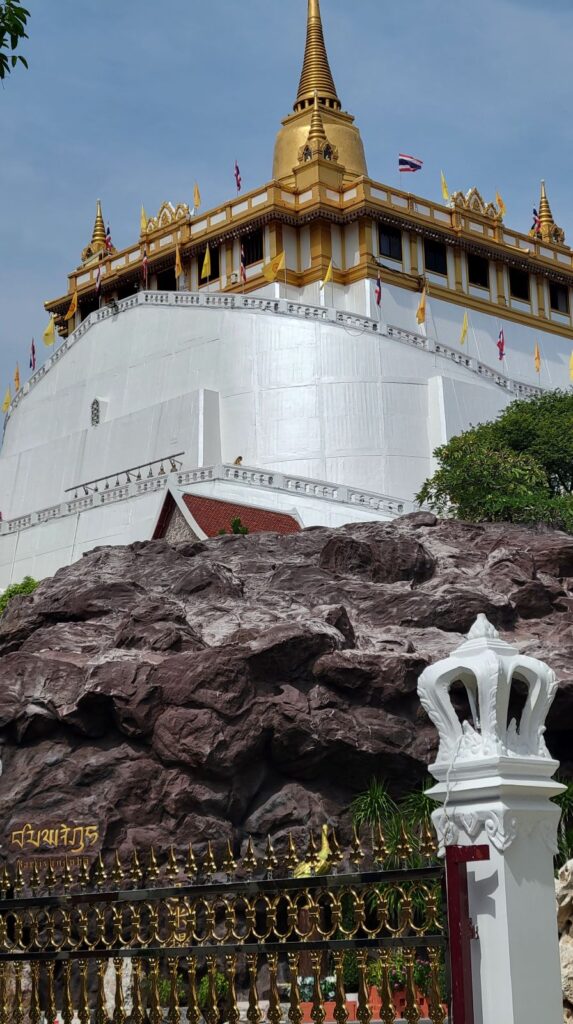
4. Wat Saket (Temple of the Golden Mount)
Located in the Old Town of Bangkok, Wat Saket better known as the Temple of the Golden Mount dates all the way back to the Ayutthaya period. The temple is known for the golden chedi tops and sits on top of an artificial hill set at 77 meters and was initially constructed at reign of King Rama IV and then completed by King Rama V. Enshrined in the temple mount are relics of the Buddha that were brought from India and is an important pilgrimage site for Buddhists.
You climb 344 steps to enter the temple grounds and once inside the simply adorned temple the views of the surrounding Old Town and historic landmarks of the Grand Palace, Chao Phraya and other sites nearby are quite breathtaking. There is a local Loy Krathong Festival,that happens yearly with devotees wrapping a large red cloth around the chedi as an act and sign of reverence.
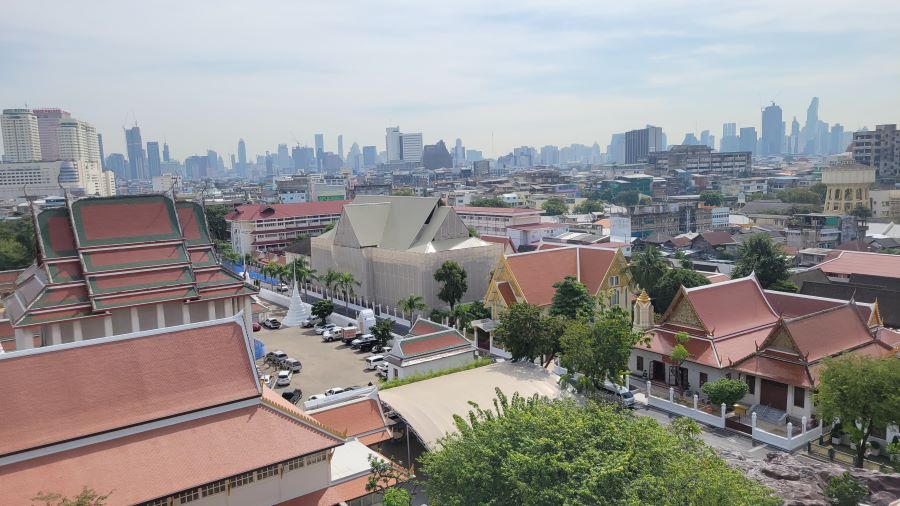
Wat Saket (Temple of the Golden Mount) Views from above
Official Website & Online Info
Wat Saket doesn’t seem to have its own standalone website, but you can find its official online presence via its Facebook page (Wikipedia). That’s the primary verified online source for updates and information.
Opening Hours
Plan your visit between 8 AM and 7 PM, with some sources even narrowing it to 5 PM. If you’re aiming for that panoramic view at golden hour—or just want softer crowds and light—an early or late slot (say, around 7 PM) could be ideal.
Entrance Fee
Expect somewhere between 50 to 100 THB, with 50 THB the more frequently reported amount.
At-a-Glance Summary
| Detail | Info |
|---|---|
| Website | Official Facebook page (via Wikipedia) (Wikipedia) |
| Opening Hours | Generally between 8:00 AM–5:00 PM, with some sources extending to 7:00 PM |
| Admission Fee | Commonly 50 THB for foreign visitors; some say 100 THB |
Quick Travel Tips
- Timing your visit: Early mornings or evenings are ideal—not just for softer light, but to avoid midday heat and crowds.
- What to bring: Comfortable shoes (there’s a climb involved), modest clothing covering shoulders and knees, and a camera for those breathtaking city views.
- What you’ll see: A gentle climb up the Golden Mount leads you through gardens and bells to a spectacular 360° view of Bangkok. The golden chedi at the summit holds Buddhist relics and adds spiritual depth to the experience
Here’s a fantastic video tour of the Temple of the Golden Mount below
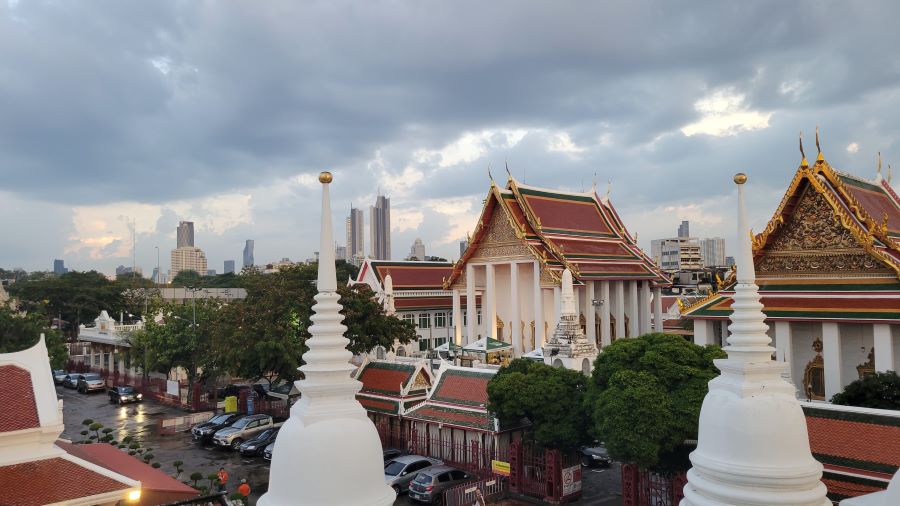
5. Wat Benchamabophit (The Marble Temple)
Visiting Wat Benchamabophit also known as The Marble Temple is one of the must visit sites of Bangkok with stunning architectural heritage that was completed in 1911 during the reign of King Rama V. The site is completed in imported Italian Marble that was used in the construction and creating a beautiful finish with Italian Renaissance influences.
The ashes of King Rama V are interred with the Phra Buddha Chennarat, a replica of the statue amid the beautiful Thai craftsmanship and also a revered sanctuary that honors this king’s legacy and cultural presence in the city.
Website or Online Presence
While Wat Benchamabophit doesn’t seem to have a dedicated official website, you can rely on reputable travel guides and city tourism sites for accurate visitor details. Even the Wikipedia entry doesn’t list independent web pages, so reputable third-party sources are your best bet.(Wikipedia)
Opening Hours
Plan your visit between 8 AM and around 5:30 PM to play it safe. Some extended hours exist, but they’re not as widely cited.
Entrance Fee (Cost)
The reported price is 20 THB, but a 50 THB figure appears occasionally. I’d suggest having up to 50 THB on hand just in case there’s a bit of flexibility or updates on pricing.
Summary Table
| Detail | Info |
|---|---|
| Website Info | No official site—use Wikipedia and reputable travel guides |
| Opening Hours | Generally 8:00 AM – 5:30 PM daily (some sources say until 6:00 PM) |
| Entrance Fee | Typically 20 THB, though some sources mention 50 THB |
Casual Visitor Tips
- Best time to go: Arrive early—right at opening—to enjoy the temple when it’s peaceful and the light is softer.
- Dress code: Modest attire required—cover shoulders and knees. You’ll also need to remove your shoes before entering buildings (this is standard for Thai temples)
- Why stop by: This temple stands out with its gleaming Carrara marble architecture, serene Buddhist statuary, cloister galleries, reflecting pools, and quiet, reflective gardens. It’s less frenetic than big tourist spots, so great for writing, photography, and simply soaking in calm.
- Nearby: If you’re already in the Dusit neighborhood, it’s easy to combine Wat Benchamabophit with stops like Vimanmek Mansion or Ananta Samakhom Hall
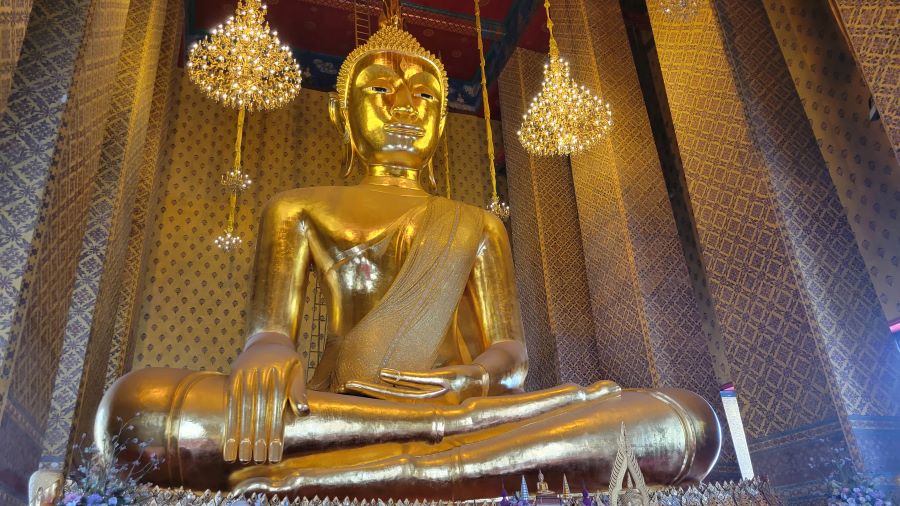
Further Reading – Visiting Bangkok
If you plan on visiting more sites and fun places around Bangkok, check out these other topics for inspiration below
How to get from Bangkok to Chiang Mai
A visit to Bangkok’s Chinatown district
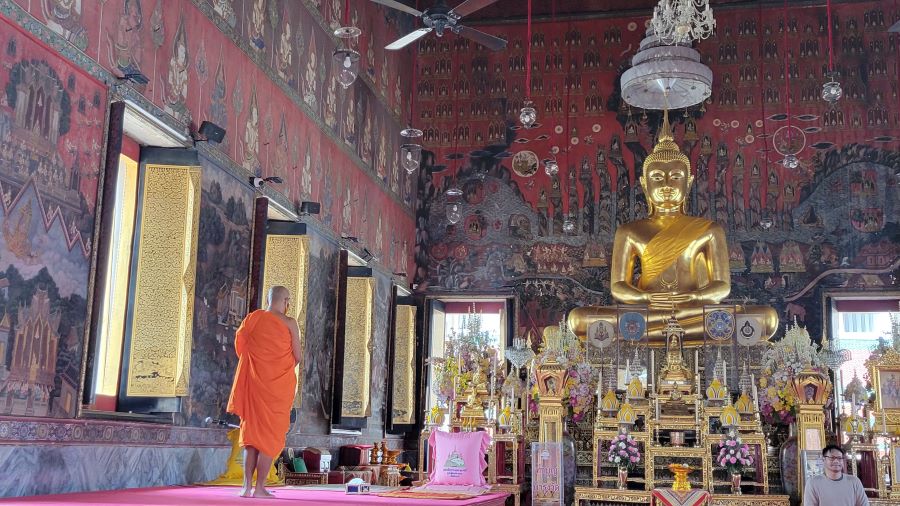
Conclusion to visiting Bangkok’s holy temples
In conclusion, exploring Bangkok’s many historic temples is an enriching experience that allows you to witness the heart and soul of the city. From the bustling Chao Phraya river, you explore the more opulent and grand temples along the river and Old town of Bangkok with these iconic temples offering a unique perspective on the rich cultural heritage and religious side of Bangkok. You’ll enjoy this other aspect of touring Bangkok and seeing a different part of the huge and busy metropolis with these cultural landmarks and holy attractions.

